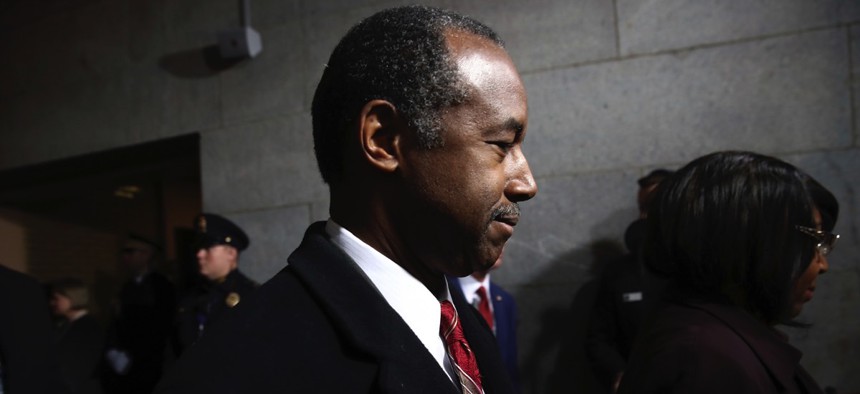Latest Round of Federal Homeless Assistance Won’t Necessarily Cover Community Losses

HUD Secretary Ben Carson Win McNamee / AP Photo

Connecting state and local government leaders
In addition to Housing and Urban Development Continuum of Care grants, officials encouraged more state, local and private funding.
The U.S. Department of Housing and Urban Development awarded a record $2 billion in Continuum of Care grants across 7,328 local homeless assistance programs Thursday, but the funding won’t necessarily offset losses some communities experienced after the department’s summer voucher freeze.
Programs that benefit from the grants provide direct housing and services to tens of thousands of temporarily and chronically homeless people. In cities like Chattanooga, Tennessee, where veterans homelessness was effectively ended, HUD’s 2017 budget cuts are now being blamed for vets ending up on the streets.
Chattanooga’s CoC is independent of the city and managed through a local public housing authority. The $2.6 million it’s receiving in the new round of federal grants may not align with current voucher needs among municipalities and local housing agencies.
“All of those funds do affect our ability to house folks,” said Neal Rackleff, HUD assistant secretary for planning and development, on call with reporters on Thursday.
Some city officials have begun to question the agency’s commitment to housing-first homeless assistance, though HUD Secretary Ben Carson continued to tout the strategy on Thursday.
Carson encouraged state and local planners to innovate within their best-performing programs, particularly during the cold winter months.
“Stable housing is critically important to health,” Carson said. “We must focus on the need to support the very best interventions.”
U.S. Interagency Council on Homelessness Executive Director Matthew Doherty said CoCs can more effectively use HUD funding, though that’s not the full answer.
Business and civic leaders, schools, employers and faith leaders must also be engaged around homelessness, he said.
“State, local and private funders need to align their investments with these grants and housing first-practices …” Doherty said.
Los Angeles County was applauded for passing Measure H in March, a quarter-cent sales tax for 10 years that will generate $335 million annually for homeless assistance, as was Oakland, California for its two-year budget allocating $185 million for services like shelters.
The largest federal competition for grant funding with the greatest number of applicants, HUD’s McKinney Homeless CoC challenge employed a new model helping unsheltered people access short-term emergency bridge housing.
Puerto Rico and the U.S. Virgin Islands had their grant application deadlines extended due to hurricane damage, so their separate awards were excluded from the announcement.
HUD determines CoC grant awards by looking at how much funding communities need to continue operating current projects, performance, strategic plans, and partnerships. CoCs receive more or less than their baseline amount depending on adoption of best practices and adjustment for housing costs.
California received the most in awards, $382.6 million across 900 local programs, and Wyoming the least, $292,329 across five. A general breakdown can be found here and a complete list here.
The city of Boston received $26.3 million to put toward ending veterans homelessness, rapid rehousing and stabilization services.
"Having weathered record-breaking cold weather these past few weeks, we are reminded just how critical these funds are to our work on the issue of homelessness," Mayor Marty Walsh said in a statement. "We have made significant progress in so many areas, but our work is not done.”
Dave Nyczepir is a News Editor at Government Executive’s Route Fifty and is based in Washington, D.C.

NEXT STORY: States OK’d to Test Impacts of Work Requirements for Medicaid Beneficiaries





